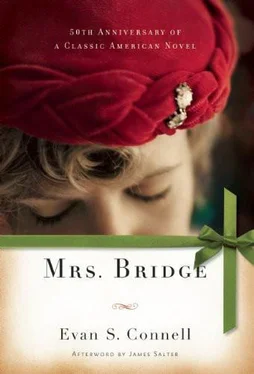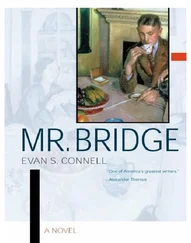It was the smallest restaurant Mrs. Bridge had ever seen. It was not much larger than her kitchen at home, but somehow or other there were a dozen oilcloth-covered tables jammed into it and every table was crowded. It reeked of cheese and wine and smoke and perspiration. Wedged between the door and a coatrack they stood and waited for three vacancies, and finally the waiter, who was a fat boy with crew-cut hair and a dirty apron, called through the smoke and the gabble, “Alors, vite! J’ai trois! Vite!”
“Okay, step on it,” Hager muttered. “He’s got three but they won’t last,” and he began pushing Mrs. Bridge into the confusion.
Finding no room on the table for her purse, and no other place to put it, she was obliged to hold it in her lap. The menu was scrawled on a blackboard on the wall and Hager translated and made recommendations and both Mr. and Mrs. Bridge accepted his suggestions. Seated next to her was an unusually ragged person wearing a short-sleeved shirt and a filthy blue beret,
“Bonjour, Claude,” said Morgan Hager.
“Ah, mon ami!” said the dirty one. “Comment a va?”
“Oh,
“How do you do?” said Mrs. Bridge.
“Enchant
“I gave him the shirt,” said Hager.
“Oh. How nice.”
“Oui,” said Claude, still chewing and eyeing her. He saw that her wine glass had not been filled, so he reached across the table for the community bottle and filled the glass for her, saying, “C’est bon> alors.”
“Thank you/’ said Mrs. Bridge. The wine was bright red and had a few specks floating on the surface.
“It tastes like vinegar/’ said Hager as he saw her looking at it doubtfully. “We can get some better stuff. Claude’s dead broke, that’s why he drinks it. I mean, it’s only about one cent a glass/’
“Oh, I’m sure it’s quite good/’ she replied, though she was sure it wasn’t. She tasted it and smiled because Claude was watching.
“C’est bon, n’est-ce pas?’ he demanded.
“Oh, yes, it’s really awfully good/’ she replied, and took another sip to prove she meant it. Claude nodded approvingly. He was eating salad now. He paused, leaned forward, and pulled a limp, black, stringy object out of the bowl. Mrs. Bridge saw it was a spider. Evidently it had climbed into the salad, or had fallen in, and drowned. Claude indifferently dropped it into a shell half filled with ashes and cigarette stubs and continued eating. In a little while the spider recovered and crawled unsteadily out of the ash tray, across the table, and disappeared on the other side.
Presently the waiter arrived with the first course and stood around for a few moments to see if they would enjoy it. The spider had taken the edge from Mrs. Bridge’s appetite, and as for salad, though she tried valiantly she could eat nothing more than a bit of tomato.
Back at the hotel that night Mr. Bridge observed that he had always heard so much about Franch cooking but if that was a fair sample he would rather eat in Kansas City.
“I thought it was very good,” she said loyally.
“You didn’t eat much/’ he said.
“Well, good heavens,” she replied, “we didn’t go there for the food/’
To the Louvre they went as soon as they got down from the Eiffel Tower. The Louvre was a symbol to Mrs. Bridge. As Texas meant size, as Timbuktu meant the ends of the earth, so did the Louvre have meaning. To be sure, there were nice galleries in the United States; in Kansas City, for example, there was the William Rockhill Nelson gallery and although she had not been in it more than four or five times in the last twenty years she was very proud that it was in Kansas City. It had a national reputation, she knew, and once in a while she thought of visiting it, for she remembered that on the few occasions she had been there she had enjoyed herself. Once inside it was very nice and of course remarkably interesting; it was just that getting there was so difficult, not that it was out of the way, it was not far from the Plaza, and there was plenty of parking space, but somehow she could not bring herself to go there. Each time the idea came to her she began to feel uncomfortably cool and depressed, and would hear once again her footsteps echoing from the marble. The few visitors she had encountered had ignored her, or at best seemed distantly courteous, It was all so impersonal, a trifle ghostly. Now if there were music and if the windows were open yes, that was the trouble. And if it could be nicely carpeted! instead of spending all that money on marble pillars. And if there were a nice tea shop and a gift shop perhaps Bancroft’s could show the gallery directors how to make things more attractive….
And so she meditated in the taxicab as they were on their way to the Louvre. It was a lovely afternoon. Men were fishing from the banks of the Seine, couples browsing along the bookstalls what oddly shaped green boxes! she thought, with the lids propped up and so many maps and pictures on display. And in the Tuileries, with the Louvre in the background, ladies were knitting and children were rolling hoops across the grass. Balloons waved at the end of sticks, or clustered together, bumping against one another in the afternoon breeze, and she noticed, as the taxicab stopped in front of the famous French museum, how many people were going in and out; Paris was really altogether different from Kansas City.
In the Louvre she immediately recognized the Venus de Milo, even though they happened to approach from the rear, and of course the Mona Lisa was unmistakable; it looked exactly like the reproductions. The tapestries seemed familiar somehow; perhaps it was just that most tapestries looked alike, and most Greek vases, and all mummies.
At the end of an hour Mr. Bridge said he thought he would go outside and wait, with the result that she continued through the Louvre alone. It was tiring, but it was exciting, and she knew she would never forget this day; it was with a feeling of regret despite the fact that she was so exhausted she could hardly walk that at last she concluded it was time to leave. Her husband was probably bored to death waiting for her; she felt a little guilty about letting him wait, but knew he would understand. He knew how she had looked forward to visiting the Louvre.
She had not managed to see everything but she reflected as she walked toward the exit that she had seen all the most famous paintings and statuary except the Winged Victory of Samothrace, she thought, and promptly stopped. It had been familiar to her as long as she could remember. There must have been a picture of it in one of her earliest school-books. Even now she could imagine it so clearly: that imperial figure advancing and the drapery streaming backward. How impressive it must be!
“Well/ she said, half aloud, “it may be ages before I’m in the Louvre again, so if I’m going to see it I’d better see it now/*
She looked around, intending to inquire where it was, but for the moment there seemed to be no English-speaking people in the corridor, so she decided to continue to the exit where there should be an information desk, or at least a guard who would understand. She turned the corner and there, all of a sudden, was the Winged Victory. Mrs. Bridge gasped and took a step backward, for the great statue seemed to be bearing down on her and it was the very image of Lois Montgomery in a nightgown*
73. Strangers in Paradise
Next day they went window-shopping along the boulevards near the Opera, and in the course of this stroll Mrs. Bridge became slightly separated from her husband. They were walking slowly up the rue Auber, stopping at whatever interested them, and she had drifted ahead, musing on the difference between Paris and Kansas City, observing the French businessmen who seemed content to loiter for hours in sidewalk cafes, and whose attitude, she reflected, was certainly pleasure before business.
Читать дальше












